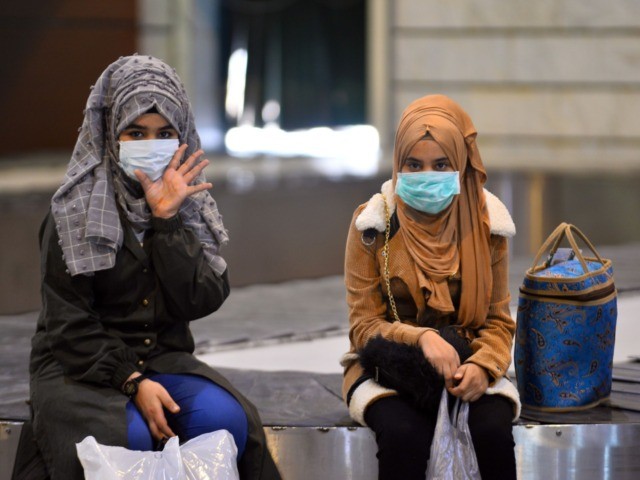Iranian parliament member Ahmad Amirabadi Farhani told reporters on Monday the Islamic regime has been lying about the severity of the Chinese coronavirus outbreak in the Mideast country and 50 people have died since it first began spreading there.
Iranian health officials insist that only 12 people have died since the first case of new coronavirus was detected in the country and that the number of cases totals 61 as of Monday.
Amirabadi represents the city of Qom, the epicenter of the coronavirus outbreak in Iran. He reportedly said in an interview with the semi-official Iranian Labour News Agency (ILNA) that a quarantine on the entire city would be necessary to prevent a pandemic. Hundreds, he asserted, were already in quarantine, many yet to be tested for the coronavirus.
The novel coronavirus originated in Wuhan, China, in December. Chinese officials shut down a meat market allegedly believed to be the origin of the virus on January 1, but took nearly a month to alert the public to a contagious disease. This week, however, scientists in China have called into question the theory that the virus jumped from animals to humans through purchases at that meat market, where anyone was allowed to come and sell wild dead animals for consumption. The market specialized in seafood.
The Wuhan virus causes respiratory failure among carriers. Initial symptoms may be mild and include coughing, fever, and body aches. Some patients develop pneumonia that rapidly becomes severe and dies. While Chinese officials insisted for weeks that those most at risk are the elderly and patients with other chronic diseases, health care workers on the front lines have died in China despite being otherwise young and healthy.
According to Radio Farda, Amirabadi said in his interview that the Iranian authorities had also disingenuously hidden the scope of the outbreak. He said that officials in Qom had quarantined 250 people and, of the 50 dead, 32 had died in isolation. About ten people are dying in the city a day, he added. Many of these cases occurred before Iranian authorities revealed to the public that the Wuhan virus was spreading in Iran at all, beginning three weeks ago, according to the outlet’s translation of his interview. Iran only admitted to having any cases of coronavirus last week.
Al-Arabiya reported that Amirabadi had to return from the Iranian parliament in Tehran to Qom after feeling sick. He reportedly attended a special session on coronavirus after being told not to do so due to his temperature. Neither Amirabadi nor the Iranian health ministry has identified him as a virus carrier.
“Currently, the situation has almost stabilized in the country, and we have managed to reduce the problem to the minimum,” Harirchi insisted.
The Iranian health officials also rejected the idea of instituting Chinese-style lockdowns on Qom or other affected municipalities. Wuhan itself remains under strict lockdown, where only one member of every family can leave the house every three days to purchase food and other necessities. Wuhan is a city of 11 million and the capital of Hubei province, a key transportation hub. Through Wuhan, the virus has reached every province of China, as well over a dozen other nations.
Iran has closed schools in Qom to prevent it from spreading among children, considered more vulnerable to significant damage from the coronavirus infection.
Iran joins the United Arab Emirates (UAE), Lebanon, Israel, Bahrain, and Kuwait in the Middle East among the nations identifying patients testing positive for coronavirus. Another Mideast nation, Iraq, announced on Monday that it had identified two coronavirus cases in southern Najaf. Baghdad only offered as identification of the patients that one was an elderly man, and another a seminary student. Both cases are believed to have originated in Iran, as Najaf often hosts Iranian travelers.
While Iran relies on a weak, impoverished healthcare system – the result of Tehran’s regime pouring billions into terrorist organizations like Hezbollah and the defense of dictators like Syria’s Bashar al-Assad, Iraq is severely fragmented and on the brink of becoming a failed state. The Shiite government in Baghdad controls only part of the country; the Kurdistan Regional Government (KRG) controls northern Erbil, and while the Islamic State has largely been defeated, areas previously controlled by ISIS are in shambles. Cities like Mosul, the former regional “capital” of ISIS, and Sinjar, the Yazidi homeland, have little access to utilities like electricity and water, much less adequate access to health care.
At press time, global health authorities have identified 79,524 cases of coronavirus worldwide and 2,626 deaths, the vast majority of them in China. These numbers do not include the cases Amirabadi identified, instead relying on Iran’s official numbers.
Another 25,157 people have been identified as “recovered,” though some of these in Wuhan have been re-quarantined after once again testing positive.

COMMENTS
Please let us know if you're having issues with commenting.